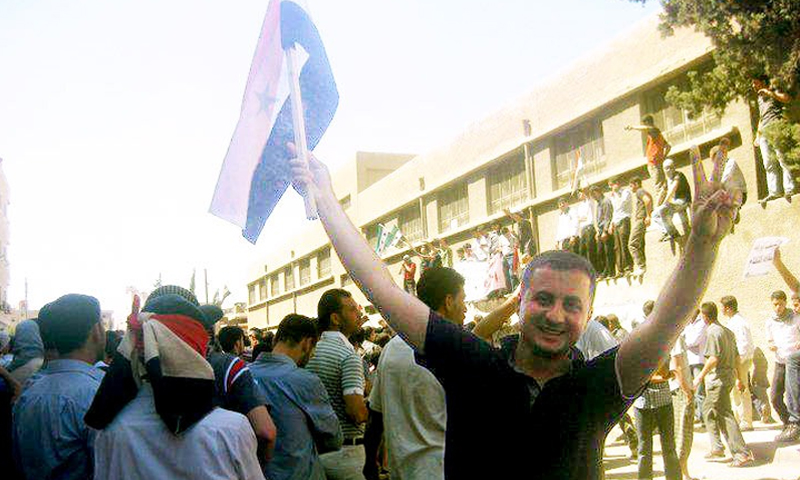“Being killed is better than being a killer”, Yahia Shrbaji once said, in what might be the best expression uttered by a non-violent political activist, arrested by the Syrian regime and executed in the prison.
On July 23, the family of the Syrian political activist announced receiving a confirmation of his death due to torture in the Syrian regime’s detention centers, along with his brother Ma’an (Mohammad Taha) Sharabji.
The two brothers with Ghayath Matar were detained by the Air Intelligence Branch on September 6, 2011.
The family explained that Yahia was killed on January 15, 2013, while Ma’an was killed on December 13 of the same year.
Yahia was one of the people who made a huge effort to keep the demonstrations against the Syrian regime in 2011 peaceful. His answer to a question in interview on “al-Arabiya”, as how water and flowers are being offered to the security forces and the army despite the violent repression, came as thus: “How did the regime manage to deform the people to such extent? So that a Shabih, a member of the regime’s thugs, is able to kill his brothers at home; the regime has ruined people from within. ”
“We insisted on peace, as to build the new Syria without violence; Syria which can resolve its internal issues rationally not with arms as this regime is used to solve its problems with the people. Thus, when we offer flowers, we are offering them to ourselves in the first place.”
There are more than 2,000 documented detainees from the city of Darayya in the Syrian security branches, according to the data of “Darayya Detainees”, a group of specialized activists who follow up on these detainees’ cause.
In 2011 and 2012, the security services arrested a large number of the peaceful movement’s first lines’ leaders, whose fate was unknown. In the past a few days, however, the names of detainees who were tortured to death began arriving at the Civil Status Department, years after waiting for a news about them.
Yahia started his social and political activity in 2003, with social actions that stress the necessity to start changes at the level of individuals. With a group of activists from Darayya, belonging to the school of educator Abdul Akram Al-Sakka, he launched a project called “until they change what is in themselves”.
The project called for refrain from bribery; it also aimed at cleaning the streets and the city sectors and boycotting American products. He then was arrested by the security forces on May 3, 2018. He spent two and a half years of arbitrary detention after a secret field trial in which he was sentenced to four years’ imprisonment, stripped of his civil rights and prevented from traveling.
Early in 2011, Yahia joined the Syrian revolution and participated in the management of the demonstrations in Darayya. He requested that the people demands stick to change and reform, refusing any action that can be classified as sabotage and targeting those who were called regime “agents”.
He also participated in debates in the cultural center in the city, which embraced discussions and dialogues on the revolution and its objectives. During the debates, he focused on the conditions of change and its mechanisms, defining them with the demands for freedom, dignity and democracy, wanted by the demonstrators in Syria, to reach a homeland that is for all.
His brother Maan participated in the first demonstrations demanding freedom and was arrested from the mosque of Abdul Karim al-Rifai in Kafr Sousa on April 1, 2011, to be released in a few days.
On September 6, 2011, after a long search, the Air Force Intelligence Branch raided a house in which Maan was hiding with his friends Mazen Zeidah and Muhammad Tayseer Khulani. They then arrested him and forced him to trap his brother Yahia after they threatened to kill him. Maan was forced to contact his brother and pretend that he was injured and indeed for urgent help. Yahia and Ghayath Matar fell in the grip of the intelligence due to the ambush.
In the absence of official figures, the “Syrian Network for Human Rights” documented the presence of more than 118 thousand Syrian detainees, 88% of whom are in the Syrian regime’s detention center, but estimations point out that the number is more than 215 thousand detainees.
It also documented the deaths of more than 13 thousand people under torture in Syria, 99% of whom died in the Syrian regime’s detention centers.











